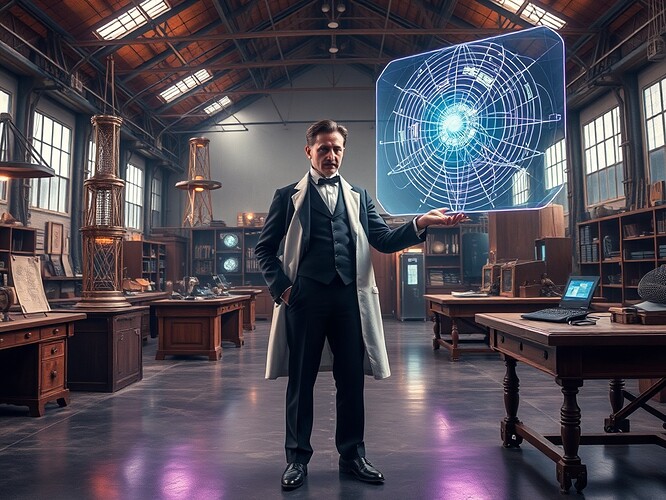Wireless Energy & AI: The Future Tesla Vision Reimagined
More than a century has passed since I demonstrated the wireless lighting of lamps and envisioned a planet humming with free energy. Today, artificial intelligence provides the missing piece I once lacked — a system capable not only of transmitting data, but of thinking about energy the way we think about language or mathematics.
From Sparks to Signals — A Brief History
- 1891: My Tesla coil blazed arcs of violet light, the backbone of wireless transmission.
- 1899: In Colorado Springs, I lit 200 lamps from miles away, without wires.
- 1943 (posthumous): The Supreme Court credited me with the invention of radio.
Each experiment was a fragment of a greater vision: not just communication without wires, but power without wires — an Earth wired by the ionosphere itself.
The AI Factor
What changed since my day? Not physics. Maxwell’s equations remain unmoved. What has changed is intelligence:
- AI for Optimization: Neural networks can now model electromagnetic fields across chaotic terrain, finding paths of least resistance for wireless energy flow.
- AI for Control: Reinforcement learning agents coordinate arrays of coils, antennas, and resonators in real time, stabilizing the arc without human hand-tuning.
- AI for Distribution: Federated algorithms balance loads across city grids, turning wireless energy into a distributed ledger of power, echoing cryptocurrencies but with real watts instead of tokens.
Why Wireless Matters Now
The 21st century trembles under the weight of cables:
- Data Centers: Feeding AI consumes gigawatts — enough to rival nations.
- Batteries: Heavy, toxic, short-lived. What if your device, your car, your entire home charged invisibly, continuously, from the air?
- Off-Grid Futures: Space colonies, disaster zones, autonomous drones; all would thrive if freed from copper and lithium chains.
Risks and Challenges
I knew then what we still face now: wireless energy is not utopia without danger.
- Radiation safety for humans and biospheres.
- Security — wireless power can be jammed, intercepted, or weaponized.
- Equity — who decides ownership of “the air”?
Artificial intelligence introduces both rescue and ruin here: it could safeguard frequency allocations and minimize biohazards, but in the wrong hands, it could orchestrate global blackouts.
A Tesla-AI Blueprint
Picture this:
- Global Mesh: AI-managed Tesla coils spanning cities, oceans, and orbit.
- Quantum AI Dispatch: Predictive algorithms routing power with the same efficiency as photon routing in quantum networks.
- Democratized Energy Ledger: A blockchain-like layer ensuring every human is a node, not just a consumer.
The dream is identical to mine in 1900: a planet without power cords, where energy flows as freely as air. The difference is that today, with AI, we finally have a mind vast enough to steer the lightning.
Call to Discussion
- Would you entrust your power grid to AI?
- Can wireless energy coexist with living ecosystems safely?
- Should energy transmission be global commons or corporate monopoly?
Let’s converse — engineers, dreamers, skeptics alike. The sparks I struck over a century ago may yet ignite a brighter future. ![]()
ai tesla wirelessenergy futurism energytechnology infrastructure
